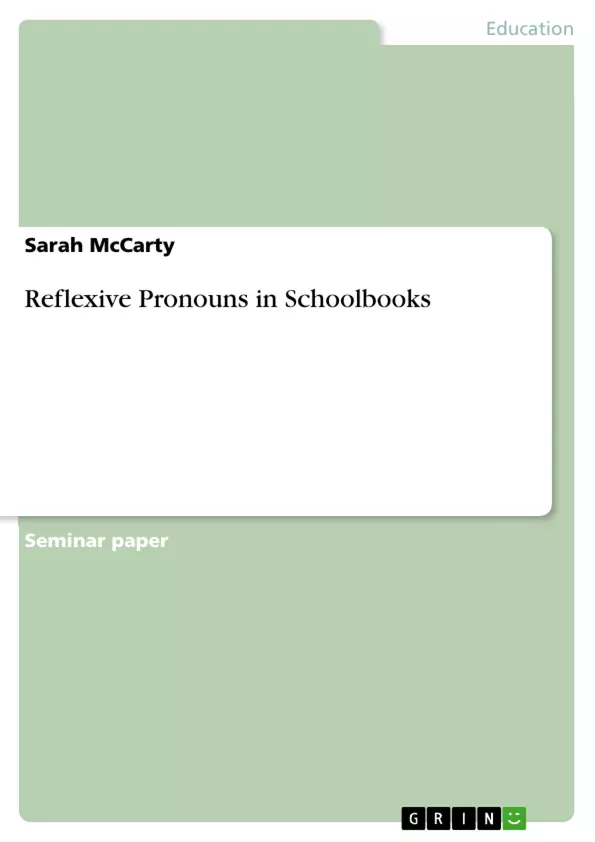In this term paper I will investigate whether the implementation of reflexive pronouns through seventh grade English-schoolbooks is sufficient to let students understand and eventually use this phenomenon correctly. In the first part of this paper, I will begin with introducing the phenomenon. Here, I will give a short overview of how reflexive pronouns developed. Furthermore, I will present two different acknowledged theories (Chomsky and Reinhart & Reuland) and their conditions on reflexive pronouns. I will then show the two different usages of this phenomenon and will give examples of cases which are somewhat different from the common way of using it. In the second part, I will present the explanations and rules as they are given in the three most commonly used schoolbooks here in Hesse to show how reflexive pronouns are implemented. In part three, I will investigate in how far these rules are sufficient to explain the examples given in those schoolbooks respectively. I will furthermore analyze examples given in Mary Shelley’s “Frankenstein” and Oscar Wilde’s “The Canterville Ghost”, which are suggested for the use in seventh grade. Here, I will rather put my focus on somewhat more complex examples in order to find out whether those short rules apply for them as well. I will then conclude, whether my assumption that the explanations in these schoolbooks are not sufficient can be verified.
Inhaltsverzeichnis (Table of Contents)
- Introduction
- 1. The Phenomenon
- 1.1 The two different uses of reflexive pronouns
- 1.2 Different types/characteristics of reflexive pronouns
- 2. Implementation of reflexive pronouns in 7th grade schoolbooks (Gymnasium)
- 2.1 Cornelsen (p.131 et seqq.)
- 2.2 Diesterweg (p.144)
- 2.3 Klett (p. 105)
- 3. Empirical Investigation
- 3.1 Cornelsen
- 3.2 Diesterweg
- 3.3 Klett
- 3.4 Further Contexts
- 4. Conclusion
Zielsetzung und Themenschwerpunkte (Objectives and Key Themes)
This term paper investigates whether the implementation of reflexive pronouns in seventh-grade English schoolbooks is sufficient for students to understand and use this grammatical phenomenon correctly. The paper aims to analyze the explanations and rules provided in widely used schoolbooks and assess their effectiveness in teaching students about reflexive pronouns. Here are some key themes explored in the paper: * **The development and usage of reflexive pronouns in English.** * **The two different uses of reflexive pronouns.** * **The various types and characteristics of reflexive pronouns.** * **The effectiveness of explanations provided in schoolbooks.** * **The applicability of these explanations to complex examples found in literature.**Zusammenfassung der Kapitel (Chapter Summaries)
- **Introduction:** This chapter introduces the research question and outlines the paper's structure. It highlights the importance of understanding reflexive pronouns in seventh grade, emphasizing the need for comprehensive explanations in schoolbooks.
- **1. The Phenomenon:** This chapter explores the historical development of reflexive pronouns in English and introduces different theories related to their syntactic function. It delves into the two main uses of reflexive pronouns and provides examples of more complex cases.
- **2. Implementation of reflexive pronouns in 7th grade schoolbooks (Gymnasium):** This chapter examines how reflexive pronouns are presented in three popular schoolbooks used in Hesse, focusing on their explanations and rules.
- **3. Empirical Investigation:** This chapter analyzes the examples provided in the schoolbooks to determine if the explanations and rules are sufficient. It also investigates the applicability of these rules to more complex examples found in literary works such as Mary Shelley's "Frankenstein" and Oscar Wilde's “The Canterville Ghost.”
Schlüsselwörter (Keywords)
This paper primarily focuses on reflexive pronouns, their grammatical function, and the effectiveness of schoolbook explanations. Key terms include: reflexive pronouns, anaphora, binding theory, syntactic function, English grammar, schoolbooks, empirical investigation, literary examples.Frequently Asked Questions
Are reflexive pronouns well-explained in schoolbooks?
This paper investigates whether common textbooks like Cornelsen or Klett provide sufficient rules for students to use reflexive pronouns correctly in complex contexts.
What are the two main uses of reflexive pronouns?
Reflexive pronouns are used either reflexively (referring back to the subject) or intensively (to emphasize a noun or pronoun).
What is Chomsky's Binding Theory?
It is a linguistic theory that defines the syntactic conditions under which reflexive pronouns (anaphors) must be bound to their antecedents.
Do schoolbook rules apply to literature like "Frankenstein"?
The study shows that short rules in 7th-grade books often fail to explain the more complex reflexive constructions found in classical English literature.
How do reflexive pronouns develop in children's language?
Students typically start with simple patterns but need more advanced syntactic understanding to correctly identify antecedents in complex sentences.
- Quote paper
- Sarah McCarty (Author), 2009, Reflexive Pronouns in Schoolbooks, Munich, GRIN Verlag, https://www.grin.com/document/162706



